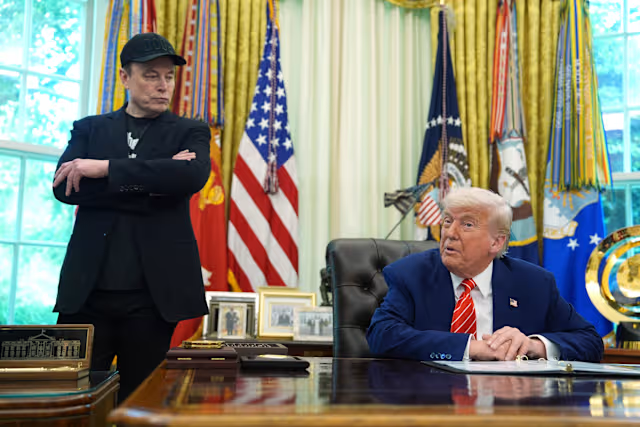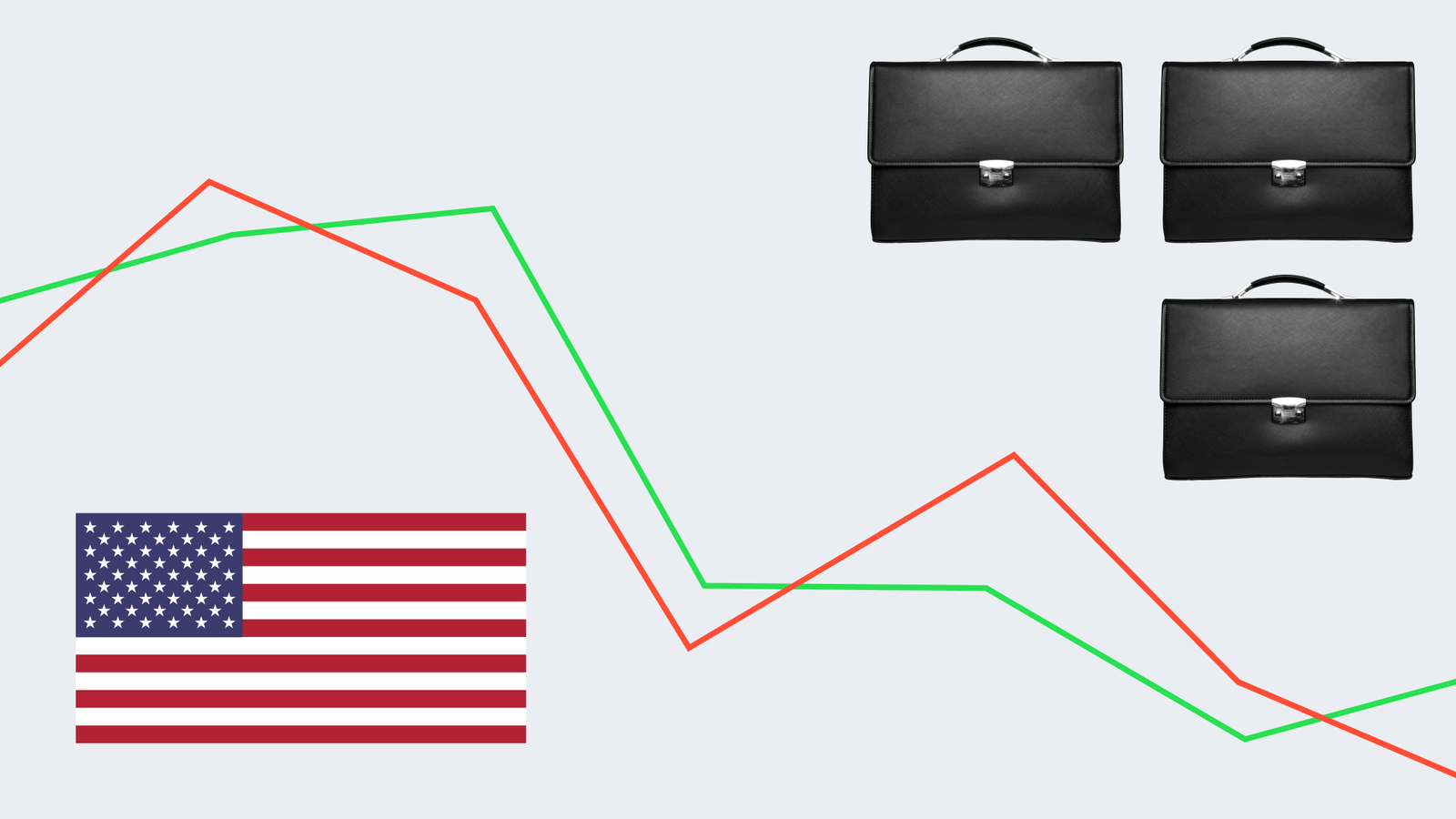Elon Musk and Donald Trump’s Truce Collapses as Feud Over Massive Spending Bill Heats Up
The brief period of calm between Elon Musk and former President Donald Trump has come to an abrupt end, lasting less than a month.
Following the Senate’s narrow procedural vote this past weekend to debate Trump’s so-called “Big, Beautiful Bill,” Musk escalated tensions on Monday by announcing plans to use his considerable financial resources to back primary challengers against Republicans who supported the expansive domestic policy legislation. Musk spent much of Monday and into early Tuesday flooding social media with posts criticizing the bill—particularly targeting its exorbitant cost.
In response, Trump fired back late Monday night, hinting that his administration might scrutinize the lucrative government contracts awarded to Musk’s companies. On Tuesday, during remarks at the White House, Trump warned Musk he risked losing “a lot more” than just government subsidies, cryptically referring to a Department of Government Efficiency—an agency Musk once headed—that could become a “monster” and “go back and eat Elon.”
This renewed feud is not as bitter or personal as the public spat that unfolded last month, when Musk accused Trump—without presenting evidence—of withholding information regarding convicted financier Jeffrey Epstein, whose criminal activities have drawn national scrutiny. Musk also claimed Trump’s name appeared in confidential government files related to Epstein.
After that peak of hostility, Musk expressed some regret, deleting several inflammatory posts, including those linking Trump to Epstein and others endorsing calls for Trump’s impeachment. His tone softened in the following weeks, with Musk focusing more on his companies and less on politics in interviews and social media.
That changed dramatically on Monday when Musk launched an aggressive social media campaign against Trump’s signature legislation. Notably, however, Musk refrained from directly naming Trump in his barrage of posts.
The clash is already affecting Musk financially: Tesla’s stock (TSLA) plummeted 7% on Tuesday following a 2% drop Monday, in stark contrast to gains in the broader markets where the S&P 500 and Nasdaq hit record highs. Since much of Musk’s wealth is tied to Tesla’s publicly traded shares, these losses are significant.
Tesla shareholders remain anxious amid fears that Trump might follow through on threats to cancel contracts with SpaceX or Tesla. On June 4—the day the Musk-Trump spat over the bill went public—Tesla’s stock plunged roughly 14%.
“This situation has deteriorated into a soap opera that casts a shadow over Tesla’s stock, with investors concerned the Trump Administration will take a tougher stance on government spending related to Musk,” said Dan Ives, an analyst at Wedbush Securities. “Tesla investors want Musk to focus on the company, not politics.”
Musk’s Campaign Against the Bill
Musk renewed his attacks Monday afternoon, threatening to challenge Congress members who supported the bill. He argued the legislation undermines his efforts at promoting fiscal responsibility by adding to wasteful spending.
According to estimates from the Congressional Budget Office, the Senate’s version of the bill would increase the deficit by nearly $3.3 trillion over the next decade—exceeding the House’s version, which adds $2.4 trillion.
The White House, however, claims the bill reduces deficits and debt while spurring economic growth. Musk remained unconvinced.
“Every member of Congress who campaigned on reducing government spending and then voted for the biggest debt increase in history should hang their head in shame! They will lose their primaries next year if it’s the last thing I do,” Musk declared on X, the social media platform formerly known as Twitter.
He posted campaign-style graphics branding supporters of the bill as “LIARS” who voted to increase the national debt by $5 trillion. Musk also floated plans for a new political party—“the America Party”—to serve as a populist alternative to Republicans and Democrats, warning the party would be formed the day the bill passed.
Musk additionally pledged support to Kentucky Rep. Thomas Massie, a rare Republican opponent of the bill, whom Trump has publicly chastised.
Trump Strikes Back
Early Tuesday, Trump responded on his platform Truth Social, suggesting that Musk’s companies receive massive subsidies and could be subject to government scrutiny.
“Elon may get more subsidy than any human being in history, by far,” Trump wrote. “Without subsidies, Elon would probably have to close up shop and head back home to South Africa. No more rocket launches, satellites, or electric cars. Our country would save a fortune.”
At the White House, Trump intensified his warnings, stating Musk could lose much more than the EV tax credits that are part of the bill’s rollback.
Asked if he would deport Musk—a naturalized U.S. citizen—Trump replied, “I don’t know, we’ll have to take a look.”
Trump also coined a striking metaphor: “We might have to put DOGE on Elon. You know what DOGE is? DOGE is the monster that might have to go back and eat Elon.”
The “DOGE” reference is a nod to the popular cryptocurrency Dogecoin, which Musk has famously supported.
The Stakes for Musk’s Companies
While SpaceX derives the bulk of its revenue from government contracts, Tesla’s income depends less directly on federal deals, but federal policies heavily impact the company’s bottom line. For example, Tesla benefits from a $7,500 tax credit for electric vehicle buyers, which has helped boost EV sales and is estimated to be worth billions to Tesla.
Tesla also reported over $8 billion in sales of regulatory credits—used by other automakers to meet emissions standards—over six years. Trump’s push to roll back emissions standards and limit states’ ability to set their own rules threatens this revenue stream.
Loss of the EV tax credit alone could cost Tesla $1.2 billion annually, with regulatory credit sales representing another $2 billion, according to JPMorgan estimates.
Analysts note Musk is aware of the risks: “Being on Trump’s bad side will not end well,” Ives remarked.
Trump claims Musk’s opposition to the bill is about preserving EV tax credits, a claim Musk denies, emphasizing his concern over rising government debt rather than subsidies.
“All I’m asking is that we don’t bankrupt America,” Musk stated.
What Lies Ahead?
The ultimate fate of the “Big, Beautiful Bill” remains uncertain. Trump is pressuring reluctant members of Congress, forcing them to choose between Musk’s potential political spending power and Trump’s influential presence.
Musk has spent over $275 million backing Trump and other Republicans in the 2024 elections, but recently signaled he may cut back on political donations.
Despite Musk’s resources, success is far from guaranteed. His recent political ventures, such as supporting a Republican candidate for Wisconsin’s Supreme Court, ended in defeat. Moreover, Musk’s popularity has waned, while Trump remains a dominant political figure.
As this bitter rivalry unfolds, both men continue to wield considerable influence, making the stakes in this political battle especially high.



